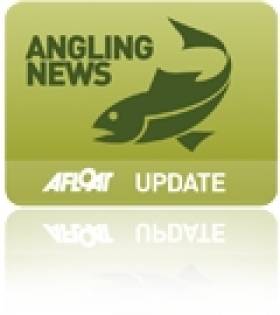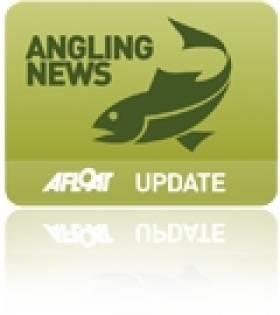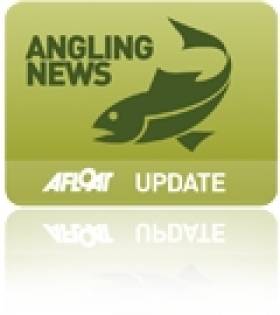Displaying items by tag: specimen fish
Four Irish Angling Records Smashed In 2014
#Angling - Four new records dominate the record fish list for 2014 which has just been published by the Irish Specimen Fish Committee (ISFC).
The most recent is a new record carp of 14.24kg caught by Aaron Cummins at Loughgall in Co Antrim on 26 October.
In August a new thin-lipped mullet record was set by Ian Mulligan, who reeled in a 2.86kg specimen at Clonakilty, Co Cork on the 23rd of the month.
Also in Cork, Stephen O'Neill set the new golden grey mullet record with his 1.2kg catch in Cork Harbour on 16 July.
And Tom Walsh is in the books for his 11.06kg spur dogfish landed at Red Bay, Co Antrim on 3 June.
The ISFC says 2014 was a very good year for anglers, with large numbers of specimen-sized fish caught besides the four new records established.
High water temperatures during the summer meant very good news for many sea anglers, with some of Ireland’s more exotic species like thin lipped mullet, golden grey mullet and gilthead quite prominent in the overall specimen fish listings. Specimen painted ray and thick-lipped mullet were also plentiful.
A total of 526 specimens were ratified in 2014, and the ISFC expects anglers both at home and abroad will be reading the report carefully to plan their angling trips in 2015, with the new year seeing tope, spurdog, smooth-hound and blue shark allowable as length-based specimens.
In other specimen fish news, the ISFC Awards Day will be held on Saturday 21 February to coincide with the Irish Angling Show weekend.
Invitations will be issued to anglers from Ireland next week. If any angler plans to attend, contact [email protected] as soon as possible.
Overseas anglers are also very welcome to attend. Certificates, etc will be posted to anglers who cannot attend, and it is intended to present anglers in the Netherlands with their awards at the VISMA 2015 angling show in Rotterdam.
The 2014 Irish Specimen Fish report is available as a PDF to read or download HERE.
Hard copies of the report will be available free of charge from the Inland Fisheries Ireland offices in Citywest Business Campus, Dublin 24 in early January. For further information contact ISFC secretary William Roche at 01 884 2600.
Specimen Fish Report For 2013 Boasts Two New Records
#Angling - The Irish Specimen Fish Committee's (ISFC) report on 2013's notable angling catches, which was published on Friday 31 January, includes two new records.
The report reveals that it was a very good year for anglers, with large numbers of specimen-sized fish caught.
High water temperatures during the summer were very good news for many sea anglers, with some of Ireland's more exotic species like gilthead bream and golden grey mullet prominent in the overall specimen fish listings. Specimen smooth-hound and spurdog were also plentiful.
The two new records are for a 3.376kg roach/bream hybrid, which as caught in Monalty Lake in Co Monaghan by Jason Dingle on 3 May, and a 3.505kg gilthead bream, which was caught by Jeremy Coleman on 17 August.
A total of 595 specimens were ratified in 2013. The Lee Reservoirs in Cork feature heavily in the freshwater fish listings with bream, rudd and various hybrids taken there over the year.
Species such as thick-lipped mullet and flounder from many different parts of the country were prominent in catches of specimen sea fish.
The report is available online as a PDF to read and download HERE, but hard copies will also be available free of charge from Inland Fisheries Ireland offices in Swords from next week.
Anglers both at home and abroad will surely be reading it carefully to plan their angling trips to catch the big fish in Ireland in 2014.
In other important developments on the specimen fish front, tope, spurdog and smooth-hound can be claimed as length-based specimens from 2014 onwards. And Dutch anglers continue to dominate the specimen fish listings for overseas anglers.
In addition, the ISFC Awards Day will be held in Dublin on 15 February. Invitations will be issued to anglers from Ireland next week. If any angler plans to attend please email [email protected] as soon as possible. Overseas anglers are also very welcome to attend.
Certificates, etc will be posted to anglers who cannot attend and it is hoped to present anglers in the Netherlands with their awards at the VISMA 2014 angling show in Rotterdam.
Killybegs Angler Catches 11lb Sea Trout
The Donegal Democrat reports that a Killybegs angler landed a record-sized sea trout at the Erne esturary in Ballyshannon recently.
John Cunningham, 48, battled for 10 minutes with the 11lb 1oz monster trout before seizing his quarry. He described the experience as "good fun".
The fish was more than five times the average caught in Irish, and beat the previous area record by some 3lbs.
Now returned waters of the Erne, the sea trout will be officially branded a specimen fish by the Irish Specimen Fish Committee.
































































